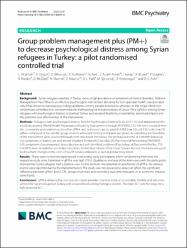| dc.contributor.author | Acartürk, Ceren | |
| dc.contributor.author | Uygun, Ersin | |
| dc.contributor.author | İlkkurşun, Zeynep | |
| dc.contributor.author | Yurtbakan, Taylan | |
| dc.contributor.author | Kurt, Gülşah | |
| dc.contributor.author | Adam Troian, Jais | |
| dc.contributor.author | Şenay, İbrahim | |
| dc.contributor.author | Bryant, R. | |
| dc.contributor.author | Cuijpers, P. | |
| dc.contributor.author | Kiselev, N. | |
| dc.contributor.author | Mcdaid, D. | |
| dc.contributor.author | Morina, Njomeza | |
| dc.contributor.author | Nişancı, Zehra Nuray | |
| dc.contributor.author | Park, Alison L. | |
| dc.contributor.author | Sijbrandij, M. | |
| dc.contributor.author | Ventevogel, Peter | |
| dc.contributor.author | Fuhr, Daniela C. | |
| dc.date.accessioned | 2022-01-13T11:37:23Z | |
| dc.date.available | 2022-01-13T11:37:23Z | |
| dc.date.issued | 2022 | en_US |
| dc.identifier.citation | Acartürk, C., Uygun, E., İlkkurşun, Z., Yurtbakan, T., Kurt, G., Adam Troian, J. ... Fuhr, D. C. (2022). Group problem management plus (PM plus ) to decrease psychological distress among Syrian refugees in Turkey: A pilot randomised controlled trial. BMC Psychiatry, 22(1). https://doi.org/10.1186/s12888-021-03645-w | en_US |
| dc.identifier.issn | 1471-244X | |
| dc.identifier.uri | https://doi.org/10.1186/s12888-021-03645-w | |
| dc.identifier.uri | https://hdl.handle.net/20.500.12511/8798 | |
| dc.description.abstract | Background: Syrian refugees resettled in Turkey show a high prevalence of symptoms of mental disorders. Problem Management Plus (PM+) is an effective psychological intervention delivered by non-specialist health care providers which has shown to decrease psychological distress among people exposed to adversity. In this single-blind pilot randomised controlled trial, we examined the methodological trial procedures of Group PM+ (gPM+) among Syrian refugees with psychological distress in Istanbul,Turkey, and assessed feasibility, acceptability, perceived impact and the potential cost-effectiveness of the intervention.
Methods: Refugees with psychological distress (Kessler Psychological Distress Scale, K10 > 15) and impaired psychosocial functioning (World Health Organization Disability Assessment Schedule, WHODAS 2.0> 16) were recruited from the community and randomised to either gPM+ and enhanced care as usual (E-CAU) (n = 24) or E-CAU only (n = 22). gPM+ comprised of five weekly group sessions with eight to ten participants per group. Acceptability and feasibility of the intervention were assessed through semi-structured interviews. The primary outcome at 3-month follow-up was symptoms of depression and anxiety (Hopkins Symptoms Checklist-25). Psychosocial functioning (WHODAS 2.0), symptoms of posttraumatic stress disorder and self-identified problems (Psychological Outcomes Profiles, PSYCHLOPS) were included as secondary outcomes. A modified version of the Client Service Receipt Inventory was used to document changes in the costs of health service utilisation as well as productivity losses.
Results: There were no barriers experienced in recruiting study participants and in randomising them into the respective study arms. Retention in gPM+ was high (75%). Qualitative analyses of the interviews with the participants showed that Syrian refugees had a positive view on the content, implementation and format of gPM+. No adverse events were reported during the implementation. The study was not powered to detect an effect. No significant difference between gPM+ and E-CAU group on primary and secondary outcome measures, or in economic impacts were found.
Conclusions: gPM+ delivered by non-specialist peer providers seemed to be an acceptable, feasible and safe intervention for Syrian refugees in Turkey with elevated levels of psychological distress. This pilot RCT sets the stage for a fully powered RCT. | en_US |
| dc.description.sponsorship | European Union's Horizon 2020 Research and Innovation programme Societal Challenges | en_US |
| dc.language.iso | eng | en_US |
| dc.publisher | BMC | en_US |
| dc.rights | info:eu-repo/semantics/openAccess | en_US |
| dc.rights | Attribution 4.0 International | * |
| dc.rights.uri | https://creativecommons.org/licenses/by/4.0/ | * |
| dc.subject | Refugees | en_US |
| dc.subject | Common Mental Health Problems | en_US |
| dc.subject | Group Intervention | en_US |
| dc.subject | Task Sharing | en_US |
| dc.subject | Pilot | en_US |
| dc.subject | Randomised Controlled Trial | en_US |
| dc.subject | Feasibility | en_US |
| dc.title | Group problem management plus (PM plus ) to decrease psychological distress among Syrian refugees in Turkey: A pilot randomised controlled trial | en_US |
| dc.type | article | en_US |
| dc.relation.ispartof | BMC Psychiatry | en_US |
| dc.department | İstanbul Medipol Üniversitesi, İnsan ve Toplum Bilimleri Fakültesi, Psikoloji Bölümü | en_US |
| dc.identifier.volume | 22 | en_US |
| dc.identifier.issue | 1 | en_US |
| dc.relation.publicationcategory | Makale - Uluslararası Hakemli Dergi - Kurum Öğretim Elemanı | en_US |
| dc.identifier.doi | 10.1186/s12888-021-03645-w | en_US |
| dc.identifier.wosquality | Q2 | en_US |
| dc.identifier.scopusquality | Q1 | en_US |



















